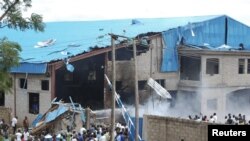ABUJA - Three churches were bombed this morning in Kaduna, Nigeria, igniting riots in the state capital and prompting a 24-hour curfew. The blasts killed 21 and injured at least 100. The violence Sunday is just the latest development in areas where tensions have risen dramatically recently.
Kaduna has been tense since after the 2011 elections when riots broke out killing nearly 700 people. Locals say the violence was political but it also cut across religious lines, deepening distrust between Muslims and Christians.
Kaduna city, the capital of Kaduna state, is now roughly divided like the country of Nigeria between a mostly-Muslim north and a predominately Christian south.
Sunday, after churches were bombed in Zaria and Kaduna city, two cities that are still recovering from last year’s carnage, riots broke out in Kaduna.
Femi Odekunle, a Nigerian professor of criminology, says increasing violence in Nigeria may have religious overtones, but the root of the problem is increasing poverty and the unequal distribution of resources in Nigeria, Africa’s most populous nation and biggest oil exporter.
"I am just telling you the inequality, political, economic, social even in terms of the legal administration of criminal justice. The inequality is there," said Odekunle.
The Nigerian Red Cross says rescue operations are ongoing. Spokesperson Nwakpa O. Nwakpa said calm is returning to Kaduna city.
No group has claimed responsibility for the church bombings, but the Islamist militant group popularly known as Boko Haram has taken responsibility for other similar attacks, including church bombings on Christmas day that killed more than 40 people, and a church bombing early this month in Bauchi that left 15 dead.
Boko Haram is blamed for more than 1,000 deaths since it began violent operations in 2009, attacking security forces, churches, schools, government buildings, newspaper offices and market places.
Kaduna has been tense since after the 2011 elections when riots broke out killing nearly 700 people. Locals say the violence was political but it also cut across religious lines, deepening distrust between Muslims and Christians.
Kaduna city, the capital of Kaduna state, is now roughly divided like the country of Nigeria between a mostly-Muslim north and a predominately Christian south.
Sunday, after churches were bombed in Zaria and Kaduna city, two cities that are still recovering from last year’s carnage, riots broke out in Kaduna.
Femi Odekunle, a Nigerian professor of criminology, says increasing violence in Nigeria may have religious overtones, but the root of the problem is increasing poverty and the unequal distribution of resources in Nigeria, Africa’s most populous nation and biggest oil exporter.
"I am just telling you the inequality, political, economic, social even in terms of the legal administration of criminal justice. The inequality is there," said Odekunle.
The Nigerian Red Cross says rescue operations are ongoing. Spokesperson Nwakpa O. Nwakpa said calm is returning to Kaduna city.
No group has claimed responsibility for the church bombings, but the Islamist militant group popularly known as Boko Haram has taken responsibility for other similar attacks, including church bombings on Christmas day that killed more than 40 people, and a church bombing early this month in Bauchi that left 15 dead.
Boko Haram is blamed for more than 1,000 deaths since it began violent operations in 2009, attacking security forces, churches, schools, government buildings, newspaper offices and market places.






